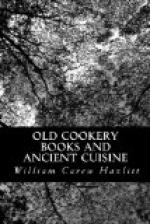Coming down to our own times, the names most familiar to our ears are Ude, Francatelli, and Soyer, and they are the names of foreigners [Footnote: A fourth work before me has no clue to the author, but it is like the others, of an alien complexion. It is called “French Domestic Cookery, Combining Elegance and Economy. In twelve Hundred Receipts, 12mo, 1846.” Soyer’s book appeared in the same year. In 1820, an anonymous writer printed a Latin poem of his own composition, called “Tabella Cibaria, a Bill of Fare, etc., etc., with Copious Notes,” which seem more important than the text]. No English school of cookery can be said ever to have existed in England. We have, and have always had, ample material for making excellent dishes; but if we desire to turn it to proper account, we have to summon men from a distance to our aid, or to accept the probable alternative—failure. The adage, “God sends meat, and the devil sends cooks,” must surely be of native parentage, for of no country is it so true as of our own. Perhaps, had it not been for the influx among us of French and Italian experts, commencing with our Anglo-Gallic relations under the Plantagenets, and the palmy days of the monastic orders, culinary science would not have arrived at the height of development which it has attained in the face of great obstacles. Perchance we should not have progressed much beyond the pancake and oatmeal period. But foreign chefs limit their efforts to those who can afford to pay them for their services. The middle classes do not fall within the pale of their beneficence. The poor know them not. So it happens that even as I write, the greater part of the community not only cannot afford professional assistance in the preparation of their meals, which goes without saying, but from ignorance expend on their larder twice as much as a Parisian or an Italian in the same rank of life, with a very indifferent result. There are handbooks of instruction, it is true, both for the middle and for the lower classes. These books are at everybody’s command. But they are either left unread, or if read, they are not understood. I have before me the eleventh edition of Esther Copley’s “Cottage Comforts,” 1834; it embraces all the points which demand attention from such as desire to render a humble home comfortable and happy. The leaves have never been opened. I will not say, ex hoc disce omnes; but it really appears to be the case, that these works are not studied by those for whom they are written—not studied, at all events, to advantage.




